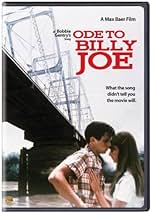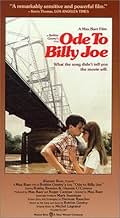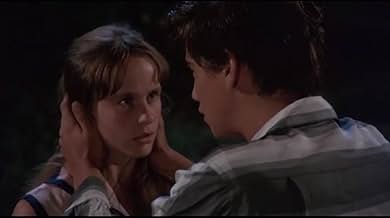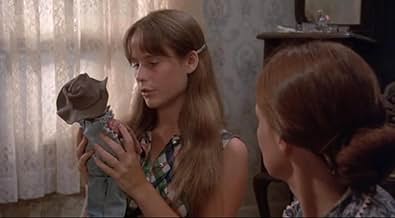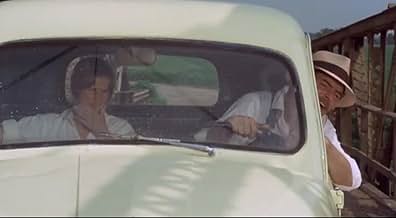Ajouter une intrigue dans votre langueIn 1950s Mississippi, teenager Bobbie Lee Hartley navigates her blossoming hormones as she is courted by Billy Joe McAllister, who is headed for tragedy.In 1950s Mississippi, teenager Bobbie Lee Hartley navigates her blossoming hormones as she is courted by Billy Joe McAllister, who is headed for tragedy.In 1950s Mississippi, teenager Bobbie Lee Hartley navigates her blossoming hormones as she is courted by Billy Joe McAllister, who is headed for tragedy.
- Réalisation
- Scénario
- Casting principal
- Récompenses
- 1 nomination au total
Avis à la une
The backstory on this 1976 film is interesting. 10 years earlier the country music singer Bobbie Gentry had written a song with the same title which tells of a young man committing suicide by jumping off the Tallahatchie Bridge. But Gentry's lyrics never reveal why the fictional Billy Joe killed himself and in interviews about the song she was very coy and unrevealing.
So, they made a movie about it. Robbie Benton, teen idol of the 70s, plays the title character although this movie is really about the young girl who loves hm: Bobby Joe Hartley, played by Glynnis O'Connor. I thought these two young actors were incredible in their roles and they held this otherwise flawed movie together. The subject matter can feel a little strange at times (there aren't many movies these days that delve into the sexual desires of a 15 year old girl) but if you can get past that, I think you'll enjoy this movie. It's not an all time great one but just for Benton and O'Connor's acting alone, it was worth watching.
And talking of the 1960's, remember Jethro Bodine and his sixth-grade education? Well the actor who created Jethro (and is also the son of the heavyweight boxing champion), Max Baer Jr., produced and directed this quirky little offering.
It is Mississippi in 1953, and the pretty adolescent girl Bobby Lee is having fantasies about boys. Billy Joe McAlister begins to court her, but as their mutual affection blossoms, darker currents are swirling beneath the Tallahatchee Bridge ...
A careful, almost literal rendering of the song, the film is a commendable effort which gets stronger and more assured as it goes along. If it is somewhat heavy with Deep South cliche (plenty of "ah dew declayer" and "raaaht neighbourly"), it really couldn't have been otherwise. The song itself is overloaded with similar stuff. I personally did not like Bobby Lee's poem, which struck me as to syrupy and too slow.
Bobby Benson is adequate as the haunted Billy Joe, but the film's real success is the performance of Glynnis O'Connor as Bobby Lee. She handles the range of emotions with aplomb, and virtually demands that the viewer identify with her. The final scene on the bridge confirms that Bobby Lee has grown as a person and has emerged from the tragedy stronger than the adults around her.
Bobby Lee's huffy soliloquy on the country road is very good, with its subtle edge of self-deprecating humour, and the long courting-scene which follows it is nicely-judged. The rueful interregnum after Billy Joe's disappearance is beautifully done, dominated by the delightful Michel Legrand piano score. The rag doll floating in the water is a striking symbol, both of Billy Joe and of the abandonment of childhood.
Verdict - If a film version of the Bobbie Gentry song is going to be done, this is probably the best way to do it.
If you read the lyrics to Bobbie Gentry's song, it seems pretty darn obvious that what the narrator and Billie Joe are throwing off the Tallahatchee Bridge is their out-of-wedlock baby.
Just Google search the lyrics, listen to the song, and see if that interpretation doesn't make much more sense than how the movie presents the story.
Le saviez-vous
- AnecdotesThe release weekend for this movie coincided with the date from the first line of the song that inspired it: "It was the 3rd of June, another sleepy, dusty Delta day"
- GaffesAs Papa Hartley and the three boys are battling it out in their trucks on the bridge the camera moves from inside the Hartley truck looking out to outside looking in. As they do this you see from the inside that the windshield in front of the driver is badly cracked but as they move to the outside angle it is not cracked at all.
- Citations
Bobbie Lee Hartley: It's gonna be all right. We've just been waiting so long and trying so hard. Oh, it's all right Billy Joe.
Billy Joe McAllister: It ain't all right! I ain't all right!
[long pause as Billy Joe walks a few steps away from Bobbie Lee]
Billy Joe McAllister: Bobbie... I have been with a man! Did you hear me? Which is a sin against nature! A sin against God! I don't know how I could have done it, I swear! I don't know how I could be wanting you and do that.
Bobbie Lee Hartley: But you were drunk. Maybe you just imagined it.
Billy Joe McAllister: I didn't imagine nothing!
Bobbie Lee Hartley: But you were drunk. Everyone saw how drunk you were.
Billy Joe McAllister: I... I knew. I knew what was happening.
Bobbie Lee Hartley: Who was it?
Billy Joe McAllister: I ain't gonna say.
Bobbie Lee Hartley: Why? I wish I could understand.
Billy Joe McAllister: I wish I could.
- Versions alternativesThe opening Saul Bass variant of the Warner Bros. Pictures logo is replaced by the 1990 variant in the VHS and 1992 variant in the WAC DVD.
- ConnexionsReferenced in The Carol Burnett Show: Dinah Shore - Went with the Wind (1976)
- Bandes originalesOde to Billie Joe
Written and Performed by Bobbie Gentry
Meilleurs choix
- How long is Ode to Billy Joe?Alimenté par Alexa
Détails
- Durée1 heure 46 minutes
- Mixage
- Rapport de forme
- 1.85 : 1
Contribuer à cette page




